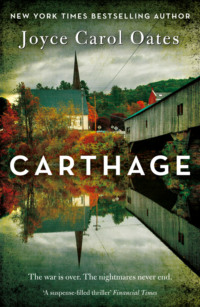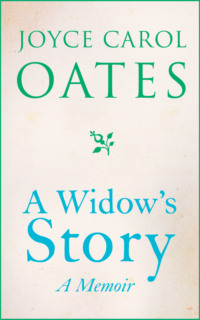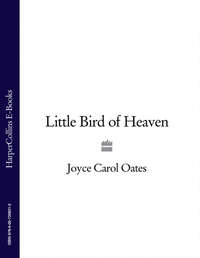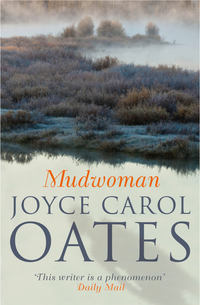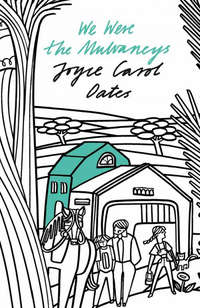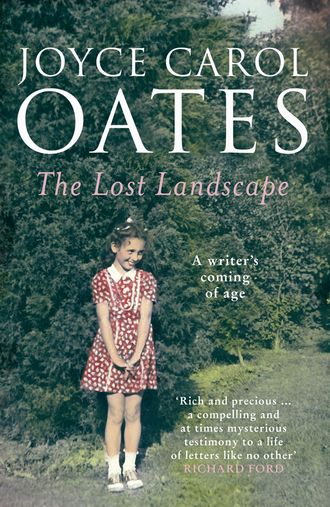
Полная версия
The Lost Landscape
The farm was the Grandfather’s property. Of farms on Transit Road it was one of the smallest. Much of the acreage was a pear orchard. Pears were the primary crop of the farm, and eggs were second. The little girl and her parents lived on the Grandfather’s property upstairs in the farmhouse. The little girl understood that the Father was not so happy living there, for the Father had been born in Lockport and preferred the city to the country, absolutely. The Father had tried his hand at farming and “hated” it. The little girl often overheard her parents speak of wanting to move away, to live in Lockport, where the Father’s mother who was the little girl’s Other Grandmother lived. Except years would pass, all the years of their lives would pass as in a dream, and somehow—they did not ever move away.
There was something strange about the Grandfather and the Grandmother but the little girl could not guess what it was. Later she would learn that the Grandfather and the Grandmother were not the Mother’s actual parents but her stepparents and it was worrisome to the little girl, that in some way steps were involved. Like the long frightening stepladder that only Daddy could climb to pick pears, apples, and cherries from the highest limbs of the trees.
The little girl noticed that, when her parents were speaking together, or any adults were speaking together, if she came near they might cease speaking suddenly. They would smile at her, they would say her name, but they would not reveal what they had been saying.
The little girl ran away to hide, sometimes. When the adults were speaking sharply to one another. When the Grandfather cursed at the Grandmother in Hungarian, and the Grandmother wept angrily and hid her flushed face in her hands.
The little girl had several times seen the Grandmother’s long coarse gray-black hair straggling down her back like something alive and livid. The little girl shut her eyes not wanting to see as she shrank from seeing the Grandmother’s large soft melon-breasts loose inside a camisole, that was wrong to see for there were things, the little girl realized, that it was wrong to see and you would be sorry if you saw.
On a farm, there are many such things. Wild creatures that have crawled beneath a storage shed to die, or the bones of a chicken or a rabbit all but plucked clean by a rampaging owl in the night.
“Joyce Carol! Come here.”
With a nervous little laugh like a cough the Mother would shield the little girl’s eyes from something she should not see. Between the Mother’s eyebrows, faint lines of vexation and alarm.
“Sweetie, I said come here. We’re going inside now.”
SOMETIMES THE LITTLE GIRL was breathless and frightened but why, the little girl would not afterward recall.
The little girl often took me with her to a special hiding place. Happy Chicken in the little girl’s arms, held tight.
My quivering body. My quick-beating heart. Smooth warm beautiful chicken-feathers! The little girl held me and whispered to me where we were hiding in the old silo beside the barn, that wasn’t used so much any longer now that the farm didn’t have cows or pigs or horses. Smells were strong inside the silo, like something that has fermented, or rotted. The little girl’s mother warned her never to play in the silo, it was dangerous inside the silo. The smells can choke you. If corncobs fall onto you, you might suffocate. But the little girl brought me with her to hide in the silo for the little girl did not believe that anything bad could happen to her.
Except the little girl began more frequently to observe that if a chicken weakened, or fell sick, or had lost feathers, other chickens turned on her. So quickly—who could understand why? Even Happy Chicken sometimes pecked at another, weaker chicken—the little girl scolded, and carried me away.
No no Happy Chicken—that is bad.
We did not know why we did this. Happy Chicken did not know.
It was like laying eggs. Like releasing a hot little dollop of excrement from the anus, something that happened.
Hearing a commotion in the barnyard, the little girl ran to see what was happening always anxious that the wounded hen might be me—but this did not happen.
Though sometimes my beak was glistening with blood, and when the little girl called me, I did not seem to hear. Peck peck peck is the action of the beak, like a great wave that sweeps over you, and cannot be resisted.
THE LITTLE GIRL GREW up, and grew away, but never forgot her Happy Chicken.
The little girl forgot much else, but not Happy Chicken.
The little girl became an adult woman, and at the sight of even just pictures of chickens she felt an overwhelming sense of nostalgia, sharp as pain. Especially red-feathered hens. And roosters! Her eyes mist over, her heart beats quick enough to hurt. So happy then. So long ago . . .
Still, she would claim she’d never seen a chicken slaughtered. Never seen a single one of the Rhode Island Reds seized by the legs, struggling fiercely, more fiercely than any human being might struggle, thrown down onto the chopping block to be decapitated with a single swift blow of the bloodstained ax, wielded by a muscled arm.
It was the Grandmother’s arm, usually. For the Grandmother was the chicken-slaughterer.
Which the girl had not seen. The girl had not seen.
The girl did recall a time when Grandfather was not so big-bellied and confident as he’d been. When the Grandfather began to cough frequently. And to cough up blood. The Grandfather no longer teased the little girl, or caused her to run from him crying as she’d run from Mr. Rooster. The little girl stared in horror as the Grandfather coughed, coughed, coughed doubled over in pain, scarcely able to breathe. The Grandfather would scrape phlegm up from his throat, with great effort, and spit the quivering greenish liquid into a rag. And the little girl would want to hide her face, this was so terrible to see.
It was explained that the Grandfather was sick with something in his lungs. Steel-filings it was said, from the foundry in Tonawanda. The Grandfather had hated his factory-job in Tonawanda but the Grandfather had had to work there, to support the farm. For the farm would not support itself, and the people who lived on it.
The Grandfather had liked to say in his laughing-bitter way that he and the other workers should be running the foundry and not the goddamn owners. Until the terrible coughing spells overcame him the Grandfather would say how the workers of the world would one day rise against the goddamn owners but that was not to happen, it would be revealed, in the Grandfather’s lifetime.
SELLING EGGS, SITTING OUT by the roadside. Sitting, dreaming, waiting for a vehicle to slow to a stop. Customers.
How much? One dozen?
Oh that’s too much. I can get them cheaper just up the road.
Always there were eggs for sale. And, at the end of the summer pears in bushel baskets. Sweet corn, tomatoes, cucumbers, potatoes. Apples, cherries. Pumpkins.
With a faint sensation of anxiety the little girl would recall sitting at the roadside at the front of the house behind a narrow bench. When sometimes the Mother had to go inside for a short while and the little girl was left alone at the roadside.
Hoping that no one would stop. Hoping not to see a vehicle slow down and park on the shoulder of the highway.
Some of the anxiety was over chickens, that made their blind-seeming way down the driveway, to the highway. Chickens oblivious of vehicles speeding by on the road, only a few yards from where they scratched and pecked in the dirt.
Anxiously the little girl watched to see that no chickens drifted out onto the road. The little girl knew, though she wasn’t altogether certain how she knew, for she’d never seen, that from time to time chickens had been killed on the road.
Sudden squawking and shrieking, and a flapping of wings. At first you rush to see what it is, and then you do not want to see what it is.
One of the constant fears of the little girl’s life was that Happy Chicken might be hit on the highway for the little girl could not watch me all of the time.
Each morning running outside breathless and eager to call to me—Happy! Happy Chicken!
And I came running, out of the coop, or out of the barn, or out of a patch of grass beside the back door, hurrying on my scrawny chicken-legs to be stroked and petted.
“Happy Chicken! I love you.”
THE LAUGHTER WAS KINDLY, and yet cruel.
Of course you ate chicken when you were a little girl, Joyce! You ate everything we ate.
No. She didn’t think so.
You’d have had to eat whatever was served. Whatever everybody else was eating. You wouldn’t have been allowed to not-eat anything on the table.
No! This was not true.
You hated fatty meat, and you hated things like gizzards, and we laughed at how you tried to hide these—beneath the rim of your plate!—as if, when the plate was removed from the table, the fatty little pieces of meat you’d left would not be discovered. But you certainly ate chicken white meat. Of course you did.
No. That was—that was not true . . .
Children ate what they were given in those days. Children ate, or went hungry. Your father would have spanked the daylights out of you if you’d tried to refuse chicken, or anything that your mother or grandmother prepared.
But no. She did not believe this.
It’s true—she does remember her Hungarian grandmother preparing noodles in the kitchen. Wide swaths of soft-floury ghost-white dough on the circular kitchen table that was covered in oilcloth, and over the oilcloth strips of waxed paper. She recalls the Grandmother, a heavyset woman with gray hair plaited and fastened tight against her head, always in an apron, and the white apron always soiled, wielding a long sharp-glittering knife, rapidly cutting dough into thin strips of noodle. And the Grandmother’s legs encased in thick flesh-colored cotton stockings even in hot weather. The surprise was, sometimes you could see a pleading girl’s face inside the soft flaccid Grandmother-stern face. And the little girl remembers something white-skinned, headless in a large pan simmering on the stove, the surface of the liquid bubbling with dollops of yellowish fat.
You loved your grandmother’s chicken noodle soup! You don’t remember?
She hides her eyes. She hides her face. She is sickened, that terrible smell of wet feathers, plucked-white chicken-flesh.
Protesting, I had nothing to do with that.
Trying to recall in a sudden panic—what had happened to her pet chicken, she’d loved so?
Our memories are what remain on a wall that has been washed down. Old billboards advertising Mail Pouch Tobacco, in shreds. The faintest letters remaining that even as you stare at them, fade. The Hungarian Grandfather who’d been so gruff, so loud, so confident and had so loved his little granddaughter he’d been unable to keep his calloused fingers out of her curls had died at the age of fifty-three, his lungs riddled with steel filings from the foundry in Tonawanda. The Hungarian Grandmother lived for many years afterward and never learned to speak English, still less to read English. The Grandmother died in a nursing home in Lockport to which the granddaughter was never once taken, nor was the granddaughter told the name of the nursing home or its specific location.
Why was this? The Mother had wished to hide the little girl’s eyes. Even when she was no longer a little girl, yet the Mother wished to shield her from upset and worry.
What happened to me? What happened to Happy Chicken?
Oh, the little girl did not know!
The little girl did not know. Just that one terrible day—Happy Chicken was not there.
She mouths the words aloud: “Happy Chicken.”
There is something about the very word happy that is unnerving. Happy happy happy happy.
A terrible word. A terrifying word. Hap-py.
Waking in the night, tangled in bedsheets, shivering in such fright you’d think she was about to misstep and fall into an abyss.
Happy. Hap-py. We were so hap-py . . .
In the cold terror of the night she counts her dead. Like a rosary counting her dead. The Grandfather who died first and after whom the door was opened, that Death might come through to seize them all. The Grandmother who died somewhere far away, though close by. The Mother who died of a stroke when she was in her mid-eighties, overnight. The Father who died over several years, also in his mid-eighties, in the new, twenty-first century shrinking, baffled and yet alert, in yearning wonderment.
Wanted you kids to have the best you could have, but that didn’t happen. We were just too poor. I worked like hell, but it wasn’t enough. Things got better later, but those early years—! The only good thing was, we lived in Millersport. We lived on the old man’s farm. You loved those animals. Remember your pet chicken—Happy Chicken? God, you loved that little red chicken.
Daddy brushing tears from his eyes. Daddy laughing, he wasn’t the kind to be sentimental, Jesus!
She was thinking of how they’d found the rooster—not Mr. Rooster then, but just a limp, slain bird—beautiful feathers smudged and broken—out back of the barn where something, possibly a fox, or a neighbor’s dog, had seized him, shaken him and broken his neck, threw him down and left him for dead. Poor Mr. Rooster!
Seeing the rooster in the dirt, horribly still, the little girl had cried and cried and cried.
And several hens, limp and bloody, eyes open and sightless. Flung down in the dirt like trash.
AND THERE CAME THE time, not long after this, or maybe it had been this time, when Happy Chicken disappeared.
The girl was stunned and disbelieving and did not cry, at first.
So frightened, the little girl could not cry.
For it seemed terrifying to her, that Happy Chicken might be—somehow—gone.
She’d run screaming to her mother who was upstairs in the farmhouse. The Mother who claimed to have no idea where the little chicken might be. Together they searched in the chicken coop, and in the barn, and out in the fields, and in the pear orchard. Calling Happy Chicken! Happy Chicken! Loudly calling Chick-chick-chick-chick-CHICK!
Other chickens came running, blinking and clucking. Yellow eyes staring.
And not one of these was me.
That morning the Mother had taken the little girl into Lockport to visit with the Other Grandmother, who was her father’s mother, who lived upstairs in a gray clapboard house on Grand Street just across the railroad tracks. The highway that was Transit Road that ran past the little girl’s house became Transit Street inside the Lockport city limits and was but a half-block away from the Other Grandmother’s house.
The Other Grandmother was named Blanche: but she was also called “Grandma”—like the (Hungarian) grandmother. The little girl tried to understand why this would be so. How could the two persons who were so different, be somehow the same—Grandma?
The Other Grandmother, who lived in Lockport, was much nicer than the (Hungarian) Grandmother who lived in Millersport. This Grandmother did not smell of grease, or chicken gizzards, or wet chicken feathers, or any other nasty thing, but rather of something pale and creamy like lilies—did this Grandmother wear perfume? Were this Grandmother’s hands soft from hand lotion? The little girl was always welcome to explore the Grandmother’s rooms which included the Grandmother’s bedroom that had such nice things in it—a shiny pink satin bedspread with white flowers, a “dressing table” with three mirrors and a mirror-top, many sweet-smelling jars and small bottles, a hairbrush with soft bristles that did not hurt the little girl’s hair when the Grandmother brushed it.
Most importantly the Grandmother who was Blanche did not speak angry-sounding guttural words in Hungarian, and would never have raised her voice to scream at anyone; you could not imagine—(the little girl could not imagine!)—this nice Grandmother being cruel to any chicken.
This was the Grandmother whom Daddy loved—for this Grandmother was Daddy’s mother. The little girl had been told this remarkable fact which she could not comprehend because Daddy was so much taller than the Grandmother it seemed to her silly—that her tall strong Daddy who was so forceful would have a mother.
This was the Grandmother who read books from the Lockport library, never fewer than three books each week. And these books smelling of the library in plastic covers. And these books smartly stamped in dark green ink LOCKPORT PUBLIC LIBRARY. This Grandmother took the little girl hand in hand into the children’s entrance of the library, to secure a library card for the little girl. For here was the surprise, that would be one of the great, happy surprises of the little girl’s life—“Joyce Carol” was old enough for a children’s library card: six. And she was allowed to take out children’s books, picture books, selected by the little girl herself, from shelves in the library—so many shelves! Such beautiful books! The little girl was so excited she could barely speak, to thank the Grandmother. Having her books stamped and discharged by the librarian made the little girl very shy but the Grandmother stood beside her so there was nothing to fear. And the little girl and the Grandmother-who-was-Blanche read these books together sitting on a swing on the front veranda of the gray clapboard house on Grand Street.
In all that day, the little girl did not once think of me.
Those hours, blinking and staring at the beautiful brightly colored illustrations in the books, turning the pages slowly, as the nice Grandmother Blanche read the words on each page, and encouraged the little girl to read too—the little girl did not once think of Happy Chicken.
But when the Mother took the little girl home again to Millersport, in the late afternoon of that day, and the little girl ran out into the barnyard to call for me, there was no Happy Chicken anywhere.
The little girl and the Mother would search the chicken coop, the barn, the orchard. . . . Oh where was Happy Chicken? The little girl was crying, sobbing.
The (Hungarian) Grandmother who was hanging sheets on the clothesline insisted she had not seen Happy Chicken.
The Grandmother had never really distinguished Happy Chicken from any other chicken—the little girl knew that. How ridiculous, the Grandmother thought, to pretend that one chicken was any different from any other chicken!
The Grandfather too insisted he hadn’t seen Happy Chicken! Wouldn’t have known what the damned chicken looked like, in fact. Anything that had to do with the chickens—these were the Grandmother’s chores, and of no interest to the Grandfather who was worn-out from the foundry in Tonawanda and couldn’t give a damn, so much fuss over a goddamn chicken.
When the father returned from his factory work in Lockport in the early evening he was in no mood either to hear of Happy Chicken. He was in no mood to hear his little daughter’s crying, that grated on his nerves. But seeing his little girl’s reddened eyes, and the terror in those eyes, the Father stooped to kiss her cheek.
Don’t cry, he’ll come back. What’s his name—“Happy Chicken”?
Sure. “Happy Chicken” will come back.
SHE IS CALLING HIM-HAPPY Chicken. Her throat is raw with calling him—Happy Chicken!
She has wakened in a sick cold sweat tangled in bedclothes. The little red chicken is somewhere in the room—is he? But which room is this, and when?
But here I am—suddenly—crouching at her feet. Eager quivering little red-feathered chicken at the little girl’s feet. The little girl kneels to pet me, and kisses the top of my hard little head, and holds me in her arms, my wings pressed gently against my sides. And the little chicken-head lowered. And the eyelids quivering. Red-burnished feathers stroked gently by a little girl’s fingers.
Where did I go, Joyce Carol? I flew away.
One day that summer, my wings were strong enough to lift me. And once my wings began to beat, I rose into the air, astonished and elated; and the air buoyed and buffeted me, and I flew high above the tallest peak of the old clapboard farmhouse on Transit Road.
So high, once the wind lifted me, I could see the raggedy flock of red-feathered chickens below scratching and pecking in the dirt as always, and I could see the roof of the old hay barn, and I could see the top of the silo; I could see the farthest potato field, and the farthest edge of the pear orchard, and the rutted dirt lane that bordered the orchard leading back to the Weidenbachs’ farm where the big barking dogs lived.
For it was time, for Happy Chicken to fly away.
DISCOVERING ALICE: 1947
THE SINGULAR BOOK THAT changed my life—that made me yearn to be a writer, as well as inspired me to “write”—is Lewis Carroll’s Alice’s Adventures in Wonderland and Through the Looking-Glass. This beautiful, slightly oversized book published by Grosset & Dunlap in 1946 was a gift of my (Jewish) grandmother Blanche Morgenstern for my ninth birthday, in 1947. (My book-loving grandmother, my father’s mother, gave me books for birthdays and Christmas and at other times as well, including Frances Hodgson Burnett’s The Secret Garden. Grandma gave me my first typewriter—a toy typewriter—and she gave me a Remington typewriter at the age of fourteen as if foreseeing how I would need it.) To this day I treasure, and keep prominently on a bookshelf in my study, this gift book with its eerily beautiful quasi-“realistic” illustrations by John Tenniel.
The illustrations of Alice amid her bizarre wonderland world depict her as surprised and sometimes intimidated by that world but never overwhelmed by it. The great illustrator Tenniel gave to Alice a commonsensical gravity and a tender sobriety quite unlike most illustrations of children in American, contemporary children’s books; Alice is recognizably a young girl, but she is not childish. There is something responsibly mature in Alice, an inclination to be skeptical, at times, of the adults who surround her; an unwillingness to be bossed around or frightened into submission. Alice is a girl who “speaks her mind”—as few children are encouraged to do, then or now. When I was nine, I was much too young to comprehend the underlying themes of Alice’s astonishing adventures, which have to do with Darwinian evolutionary theory and the principle of “natural selection through survival of the fittest”—a controversial issue of the Victorian era that represented a challenge to conventional Christian theology, one not entirely resolved in the twenty-first century.
Like any child enraptured with a favorite book, I wanted to be the book’s heroine—I wanted to be “Alice.” It must have occurred to me that Alice was very unlike any girl of my acquaintance; she seemed to belong to a foreign, upper-class environment with customs (tea-time, crumpets, queens, kings, footmen) utterly alien to the farming society of Millersport, New York. I think that I learned from Alice to be just slightly bolder than I might have been, to question authority—(that is, adults)—and to look upon life as a possibility for adventures. If I’d taken Alice for a model, I was prepared to recognize fear, even terror, without succumbing to it. There are scenes of nightmare illogic in the Alice books—numerous dramatizations of the anxiety of being eaten, for instance—that suggest the essential gravity of the books, yet Alice never becomes panicked or loses her common sense and dignity.



